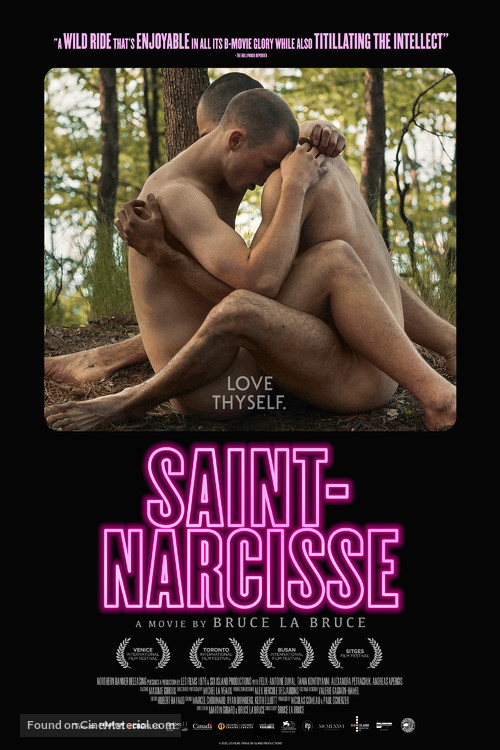(2021, 101 min)
Country: Canada
Director: Bruce LaBruce
Studio: Film Movement
Language: English
SYNOPSIS: The latest film from maverick director Bruce LaBruce, Canada's reigning "King of Kink," follows Dominic (Felix-Antoine Duval), a young man with a fetish... for himself. Nothing turns him on more than his reflection, with much of his time spent taking Polaroid selfies. When his loving grandmother dies, he discovers a deep family secret: his mother didn't die in childbirth as he was told. He also has a twin brother named Daniel who was raised in a remote monastery by a depraved priest, held captive against his will. The power of destiny brings together these two beautiful, identical brothers, who are soon embroiled in a blasphemous web of sex, revenge and redemption. Set in the early 1970s and the afterglow of sexual liberation, Saint-Narcisse is a taboo-busting love letter to the psychosexual thrillers of that era.
REVIEW:
Bruce LaBruce's "Saint Narcisse" brings together mythology, religion, self-obsession and sex in in 1970s Quebec. He takes the myth of Narcissus, who fell in love with his own reflection in the water, seems like quite an obvious move and filters it as a 1970s cult movie and adds to it with a pair of lesbian lovers who have gone off the grid; a young monk who is a cigarette- smoking, volleyball-averse lookalike of the protagonist; and an abusive gay priest who is obsessed with Saint Sebastian. LaBruce balances retaining the anarchic, B-movie-influenced aesthetic of his earlier films with "a new level of finesse in terms of how everything has been put together."
The film opens with a shot of the Dominic (Felix-Antoine Duval) the protagonist's crotch. He's at a laundromat and after taking a bra out of the drier, he begins talking with the only other customer there, a beautiful young woman explaining to her that the piece of lingerie is his grandmother's. to whom he apologetically suggests the item is his grandma's. The two have sex almost immediately after this as people on the street watch what is going on in the laundromat. At the end of the scene, we see that Dominic is confused, thinking that he saw someone who looks like him in the group of watchers. LaBruce has suggested something about his main character's inner state.
When Dominic goes home, we see that and he lives with his French-speaking grandmother (Angele Coutu). She is the starting point for a series of revelations about Dominic's family that leads him to the Quebec countryside, where he meets two women (Tania Kontoyanni and Alexandra Petrachuk). They are lovers and also a key to unraveling Dom's family history.
Dominic also meets another attractive young guy named Daniel, who looks just like him (Duval and some body doubles). He's tied up in the family tree, too, though he's had a very different upbringing. Daniel grew up in a monastery run by Father Andrew (Andreas Apergis), who is obsessed with both Saint Sebastian and Daniel.
The film's use of mythological and religious allusions and recent props like the camera that draws a line from Greek mythology all the way to the present without breaking the early 1970s illusion. Dominic is self-obsessed and the film suggests that self-obsession has always been there and that it is quite normal that people want to know who they are and where they come from. We begin to wonder how much obsession with oneself is too much and whether there should there be boundaries. We do get something of an answer to these in the film's final scene.
The film cuts back and forth between places and timelines without ever losing the viewer and we realize that we are on a journey that is a lot of fun and intellectual at the same time. LaBruce manages to have twins (or doppelgangers), incest, a cabin in the woods, nuns and/or monks, a motorcycle driver, lesbians living in the wild, and a sexually abusive priest all in one movie. "Saint Narcisse" is an homage to 70's Quebecois cinema is LaBruce's most traditionally narrative and dramatic film to date.
LaBruce has said that "Narcissism has obviously become the default psychological state, the ideological white noise of the new millennium, evidenced by selfie culture and social media solipsism. So I thought it was high time for a more contemporary reinterpretation of the Narcissus myth." What he gives us is a bizarre drama that reveals a family secret, forbidden love and a long-lost twin brother who Dominic discovers has been raised by a twisted monastery ruled by the domineering Father.
-- Review by Amos Lassen, Reviews(http://wwww.reviewsbyamoslassen.com)




